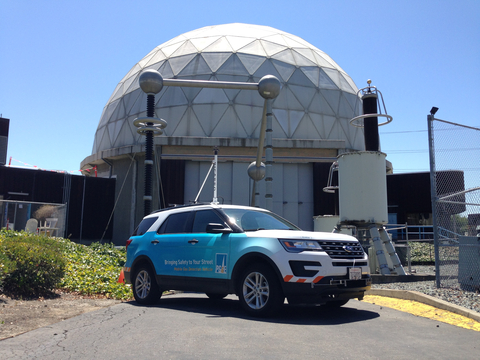PG&E Deploys Advanced Methane Detection Technology for Gas Distribution Safety Survey
PG&E Deploys Advanced Methane Detection Technology for Gas Distribution Safety Survey
Over 1.2 million customer service lines to be surveyed
SAN FRANCISCO--(BUSINESS WIRE)--As part of PG&E’s ongoing commitment to provide customers with safe, reliable natural gas service, the company conducts comprehensive surveys of its gas distribution pipeline system. This year, PG&E will survey 1.2 million customer service lines, customer gas meters, and corresponding distribution pipeline.
PG&E’s leak survey program covers the entire extended 42,000-mile distribution system on a three-year cycle under the company’s accelerated inspection program, compared to the five-year cycle that is mandated by law. Distribution lines carry natural gas from the high-pressure transmission pipelines into communities at a reduced pressure. These lines feed service lines that connect directly to natural gas meters. PG&E also surveys its entire high-pressure transmission pipeline system twice per year.
“Over the course of this year, our crews will cover thousands of miles as they carefully survey the system. They will be equipped with technologies that are so precise, we are able to detect even the smallest molecule of methane. This proactive assessment is part of our comprehensive commitment to operate a safe, reliable, and environmentally focused system that provides customers with natural gas 365 days a year,” said Joe Forline, PG&E Gas Operations Senior Vice President. PG&E will utilize two methods to conduct these inspections, mobile patrols and traditional foot patrols.
Mobile patrols utilize state-of-the-art vehicle-mounted Picarro Surveyor™. This highly sensitive leak detection technology measures methane plumes in the air, maps the location, and prioritizes the leak by its grade within PG&E’s system. To conduct inspections utilizing this method, a vehicle equipped with the methane sensors drives through a neighborhood measuring the air and methane in parts per billion, allowing the sensors to identify and pinpoint the exact location of the methane source.
Traditional on-foot patrols conducted by PG&E personnel and contractors use advanced hand-held methane detection devices. This year, PG&E has deployed new hand-held leak detection devices that surveyors will use when they inspect service lines and customer meters. For gas meters that are in inaccessible areas, customers will be asked to provide access. Access to inspect all meters is critical to the safe operation of PG&E’s gas system. When these inspections are being conducted, customers will see PG&E employees or contractors, and both will have company-issued identification badges which they will present upon customer request. PG&E contractors will not be operating PG&E-marked vehicles, and customers can ask to see identification to confirm their identity.
When leaks are identified on gas distribution systems, utilities including PG&E, they are assigned a grade based on a national scale. If leaks are assigned as “grade one,” PG&E will make immediate repairs. As part of its ongoing efforts to curb emissions from its system, PG&E also prioritizes repairs for the highest emitting leaks.
What Customers Should Know
- PG&E will conduct foot or mobile patrols in each area, or a combination of both.
- Foot patrols will be conducted during the hours of 6:00 AM and 4:00 PM.
- Picarro™ mobile surveys will be conducted during the hours of 8:00 PM and 8:00 AM. These surveys will be conducted using PG&E-marked vehicles.
- PG&E employees or their contractors will carry company-issued identification and will be prepared to share it upon request.
- Customers may also call PG&E Customer Service at 800-743-5000 to confirm the identity of a PG&E gas representative.
- For grade one leaks, PG&E will dispatch construction crews to make immediate repairs. This work may occur during evening hours and result in minor service interruptions while repairs are completed and the area is made safe.
- Customers can find more information about leak surveys here and general gas safety information here.
About PG&E
Pacific Gas and Electric Company, a subsidiary of PG&E Corporation (NYSE:PCG), is a combined natural gas and electric utility serving more than 16 million people across 70,000 square miles in Northern and Central California. For more information, visit pge.com and pge.com/news.
Contacts
MEDIA RELATIONS:
415-973-5930
